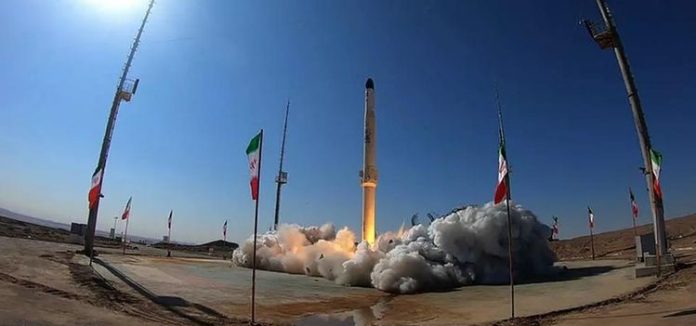Three months after launching a satellite with Russia’s assistance, Iran has declared the completion of a successful test flight of a rocket designed to launch satellites into orbit.
The US has frequently expressed concern that such launches could advance Iran’s ballistic missile technology, perhaps leading to the delivery of nuclear warheads.
Iran, though, has maintained that its satellite and rocket launches are purely for defense or civil uses and that it is not aiming to develop nuclear weapons.
The “successful suborbital launch of the satellite launcher dubbed Ghaem-100” was announced on state television.
It stated on Saturday that “the flight test of this launcher employing the Rafe solid-fuel vehicle has been successfully completed.”
According to official media, Iran’s Nahid satellite will be launched using the rocket by the Ghaem 100, according to Amir Ali Hajizadeh, head of the Revolutionary Guard’s aerospace section that created the rocket.
The first sub-orbital stage of the rocket was put through its paces on Saturday, according to the reports.
It claimed that Ghaem-100 could launch satellites weighing 80 kilograms (176 pounds) into orbits 500 kilometers (just over 300 miles) above the Earth’s surface.
In April 2020, Iran was able to successfully launch its first military satellite into orbit, earning harsh criticism from Washington.
Another Iranian satellite, known as Khayyam, was launched by Russia in August of this year using a Soyuz-2.1b rocket from the Baikonur Cosmodrome in Kazakhstan.
According to Iran’s space agency, Russia built the equipment under Iranian supervision.
At the time, the US asserted that a growing Russia-Iran alliance constituted a “profound threat” to the globe and that the Khayyam would offer “major eavesdropping capabilities.”
The goal of Khayyam, according to Iran’s space agency, was to “watch the country’s boundaries” and assist in the administration of agriculture and natural resources.
The failure of multiple satellite launches by Iran, which has one of the largest missile programs in the Middle East, in recent years has been attributed to technical difficulties.

